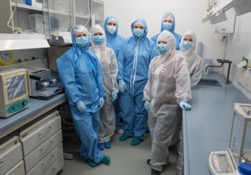Sociology/Anthropology Major – Anthropology

I was involved in the Anthropology Club as well as some informal team sports.
What are you doing now?
I am a Lecturer (equivalent of an assistant professor) at the University of York in the United Kingdom. I teach and research in the Department of Archaeology, and I lead the BioArCh Ancient DNA laboratory.
How did you get to this place in your life/ career?
After Truman, I studied and researched at different universities in the US and abroad. It took over a decade to reach a permanent position in the academic world, but it has been a very rewarding experience where I traveled extensively and met many brilliant people.
Have you been to graduate school? If so, where did you go? Did you go right after graduating from Truman?
I went to the University of Connecticut for an MSc and a PhD in Anthropology. I had a year off between graduating from Truman and going to UConn. I planned to enter graduate school immediately after undergraduate work, but I didn’t have a clear research focus and wasn’t admitted to a program. Still, the year off was useful to do archaeology fieldwork and carefully consider whether I wanted to attend graduate school.
Do you have any advice for Truman students who are interested in going to graduate school?
First, make sure you apply to multiple universities in the event that you are not admitted to your top choice. For each program, identify a faculty member who could act as your supervisor. Contact the professor in advance to see if they are accepting new students, explain why you find their research exciting, and tell them about your undergraduate projects, fieldwork, future goals, etc. Also, consider applying to graduate programs in other countries. European MSc programs are short (1 year), and their graduate classes are frequently in English (especially Scandinavia and Northern Europe). PhD programs in Europe operate differently, as they generally are focused on pre-defined projects, but they can provide competitive salaries and are shorter than US PhDs (often only 3 years instead of 4-6 years). If you are accepted to multiple programs, contact students in the program to learn more about their living arrangements, teaching load, and supervision experience.
How has the education you’ve received from Truman helped you?
Truman provided an excellent liberal arts background that gave me a lot of options for future studies and jobs. It was useful to have a broad anthropology training to give a unique perspective in my current position in an archaeology department
Is/are there any particular class(es) you’re glad you took? Did you like it/them at that the time?
Classes that emphasized data analysis and statistics were challenging yet in the end very useful. Learning software programs like SPSS was a good way to understand how to analyze data in archaeology as well as other disciplines. Today I mostly use freely available software like R, but the underlying concepts are still helpful.
What is your favorite memory of your time at Truman?
I had a good set of friends at Truman, and spending time with them in the dorms and off campus was a blast.
Why is Truman a good school at which to study?
Truman had many great faculty members who really care about the students. And being away from big cities can make it easier to focus on studies.
Do you have any advice for someone wanting to go into the same line of work as you?
You have to be patient and resilient if you want to become a professor. Professor positions are very competitive, and most professors do additional research beyond their PhD in postdoc positions. These 2–3-year positions often require moving across the country or the world, which can be difficult. Still, if you care deeply about teaching and research, it is worth the dedication.
What do you miss most about campus life/ living in Kirksville?
Living in a small town has a lot of benefits, like being able to get around easily as well as quick access to outdoors activities.
If you could teach current students one thing, what would it be?
Be sure to make time for life outside the university, as connections with friends and family last forever and help keep you grounded.
Are you a SOAN Truman graduate?
If you’re interested in sharing information about what you’re doing now, go to our SOAN Alumni Spotlight Submission Form.